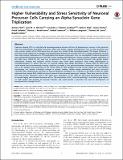Higher Vulnerability and Stress Sensitivity of Neuronal Precursor Cells Carrying an Alpha-Synuclein Gene Triplication
Author(s)
Flierl, Adrian; Oliveira, Luís M. A.; Falomir-Lockhart, Lisandro J.; Mak, Sally K.; Hesley, Jayne; Soldner, Frank; Arndt-Jovin, Donna J.; Jaenisch, Rudolf; Langston, J. William; Jovin, Thomas M.; Schüle, Birgitt; ... Show more Show less
DownloadFlierl-2014-Higher vulnerability.pdf (11.92Mb)
PUBLISHER_CC
Publisher with Creative Commons License
Creative Commons Attribution
Terms of use
Metadata
Show full item recordAbstract
Parkinson disease (PD) is a multi-factorial neurodegenerative disorder with loss of dopaminergic neurons in the substantia nigra and characteristic intracellular inclusions, called Lewy bodies. Genetic predisposition, such as point mutations and copy number variants of the SNCA gene locus can cause very similar PD-like neurodegeneration. The impact of altered α-synuclein protein expression on integrity and developmental potential of neuronal stem cells is largely unexplored, but may have wide ranging implications for PD manifestation and disease progression. Here, we investigated if induced pluripotent stem cell-derived neuronal precursor cells (NPCs) from a patient with Parkinson’s disease carrying a genomic triplication of the SNCA gene (SNCA-Tri). Our goal was to determine if these cells these neuronal precursor cells already display pathological changes and impaired cellular function that would likely predispose them when differentiated to neurodegeneration. To achieve this aim, we assessed viability and cellular physiology in human SNCA-Tri NPCs both under normal and environmentally stressed conditions to model in vitro gene-environment interactions which may play a role in the initiation and progression of PD. Human SNCA-Tri NPCs displayed overall normal cellular and mitochondrial morphology, but showed substantial changes in growth, viability, cellular energy metabolism and stress resistance especially when challenged by starvation or toxicant challenge. Knockdown of α-synuclein in the SNCA-Tri NPCs by stably expressed short hairpin RNA (shRNA) resulted in reversal of the observed phenotypic changes. These data show for the first time that genetic alterations such as the SNCA gene triplication set the stage for decreased developmental fitness, accelerated aging, and increased neuronal cell loss. The observation of this “stem cell pathology” could have a great impact on both quality and quantity of neuronal networks and could provide a powerful new tool for development of neuroprotective strategies for PD.
Date issued
2014-11Department
Massachusetts Institute of Technology. Department of Biology; Whitehead Institute for Biomedical ResearchJournal
PLoS ONE
Publisher
Public Library of Science
Citation
Flierl, Adrian, Luís M. A. Oliveira, Lisandro J. Falomir-Lockhart, Sally K. Mak, Jayne Hesley, Frank Soldner, Donna J. Arndt-Jovin, et al. “Higher Vulnerability and Stress Sensitivity of Neuronal Precursor Cells Carrying an Alpha-Synuclein Gene Triplication.” Edited by Patrick Lewis. PLoS ONE 9, no. 11 (November 12, 2014): e112413.
Version: Final published version
ISSN
1932-6203